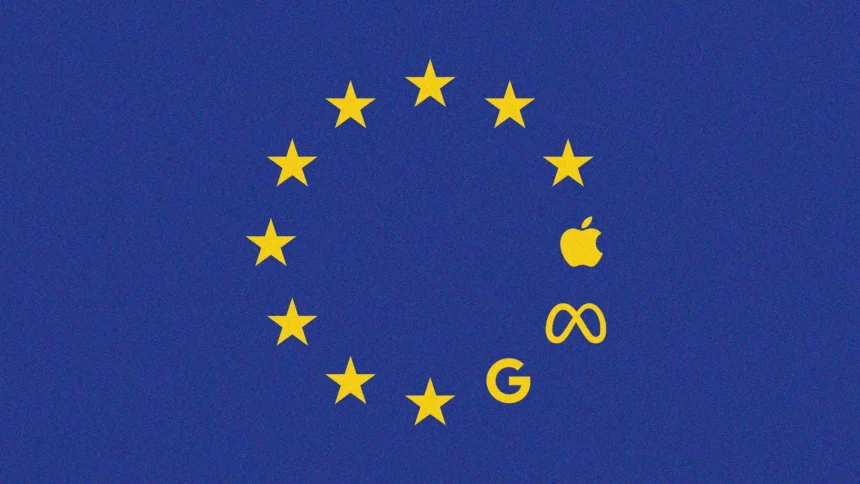European regulators are taking a closer look at U.S. tech companies, raising concerns about data privacy, corporate influence, and the role of American firms in critical industries. With Meta facing legal action over its advertising model, Tesla dealing with plummeting sales in Europe, and governments questioning their reliance on U.S. cloud providers, the relationship between Europe and American tech giants is shifting.
Privacy concerns, potential political influence from the U.S., and worries about digital sovereignty fuel these fights. European policymakers are increasingly skeptical of these companies’ power, leading to growing regulatory actions and policy changes.
What’s Happening & Why This Matters
Meta’s Data Practices Under Fire
Meta is again facing legal scrutiny in Europe, with regulators investigating claims that the company has continued tracking users despite opt-out requests. Consumer protection groups from Germany, Spain, and Norway have filed new complaints against Meta’s data practices, arguing that its advertising model violates EU privacy laws. The case has been sent to Ireland’s Data Protection Commission, which oversees Meta’s European operations.
This isn’t the first time Meta has faced penalties over data use. Earlier this year, the company was fined €1.2 billion for transferring European user data to the U.S., violating General Data Protection Regulation (GDPR) rules. The latest complaints could result in additional fines or force Meta to adjust its data policies further.
Adding to the tensions, Meta CEO Mark Zuckerberg has taken a more vocal stance on U.S. policy, aligning with Donald Trump’s views on deregulation. This has fueled European concerns that American tech companies could act in the interests of U.S. policymakers rather than in compliance with EU laws.
Tesla’s Sales in Europe Take a Hit
Tesla is seeing a downturn in its European sales, with numbers dropping by nearly 50% in key markets. While competition from European automakers plays a role, the backlash against Elon Musk also has an effect. Musk’s alignment with U.S. political figures—particularly Trump—has put Tesla in the spotlight for reasons unrelated to its cars.
European policymakers and consumers have expressed concerns about Musk’s influence, particularly regarding his ownership of X (formerly Twitter) and its misinformation and content moderation approach. Tesla’s decline in sales also coincides with new European policies that favor local electric vehicle manufacturers, giving them an advantage through stronger government incentives and subsidies.
While Tesla remains a major player in the EV market, its position in Europe is no longer as dominant as it once was. The company’s future in the region depends on how well it adapts to changing regulations and shifting public perception.
Dutch Government Raises Concerns Over U.S. Cloud Providers
The Netherlands is rethinking its dependence on American cloud services, citing national security and privacy concerns. A new audit by the Netherlands Court of Audit warns that using U.S.-based cloud providers—such as Google, Microsoft, and Amazon Web Services (AWS)—could expose European data to U.S. government access under the CLOUD Act.
The CLOUD Act allows American authorities to request data from U.S. companies, even if that data is stored in Europe. This has led to concerns that a political shift in the U.S., particularly a Trump reelection, could bring more aggressive data collection policies. Dutch officials worry this could compromise the security of government and private-sector information.
Despite these concerns, transitioning away from U.S. cloud providers is a challenge. A KPMG report found that European cloud alternatives lack their American counterparts’ scale, efficiency, and pricing competitiveness. The Dutch government has temporarily halted new cloud migration projects while exploring potential alternatives.
TF Summary: What’s Next
European regulators are clarifying that U.S. tech companies will face increased scrutiny. Meta is under pressure to comply with GDPR, Tesla is struggling to maintain its foothold in the EV market, and Dutch authorities are questioning the security of American cloud providers.
Following the U.S. presidential election, European policymakers are keeping a close watch on how tech police are modified under the new administration. With President Trump’s return to office, the EU may take stronger measures to limit U.S. corporate influence. Under a Harris administration, negotiations over data privacy and tech regulation would have likely continued. Europe has a new approach to U.S. tech firms. How willing are the companies to adapt to maintain their regional standing?
— Text-to-Speech (TTS) provided by gspeech


